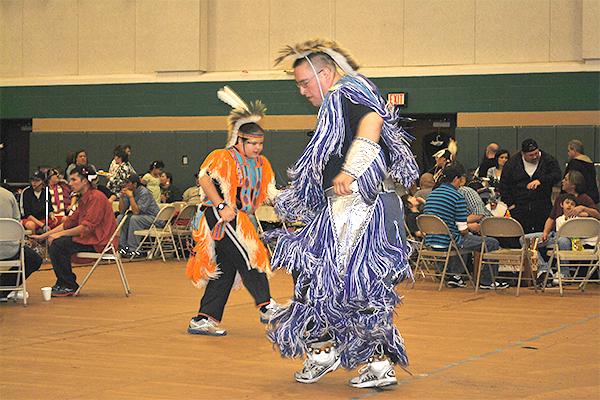The 21st annual “Learning to Walk Together” Traditional Pow Wow will be held Saturday March 15 in the Vandament Arena. The powwow is sponsored by the Native American Student Association (NASA) and the Center for Native American Studies (CNAS).
The powwow will feature traditional Anishinaabe song, dance and is open to the public. NMU students are admitted for free with a student ID. The powwow has a five dollar charge for non-students.
The first “Learning to Walk Together” Pow Wow was held in March 1992. April Lindala, the head of the CNAS, was at the event’s inception. She stressed the amount of work that goes into this event, which can cost tens of thousands of dollars.
“NASA was writing grants in the summer to make sure the ball was rolling,” Lindala said. “It takes months and months to plan this, so to see it in its final laps this week is pretty exciting.”
The powwow’s title was originally chosen to appeal across cultures for the sake of unity.
“This is about community building, as well as a celebration of who we are,” Lindala said.
Martin Reinhardt, Ph.D., is a professor in the CNAS who will be dancing in the second grand entry at Saturday’s powwow.
Reinhardt emphasized that powwows reflect how Native American traditionalism changes and adapts with time.
“I was telling my wife that I’m making new regalia,” Reinhardt said. “My new regalia includes Pink Floyd. It shows that we’re dynamic; we aren’t just static in the past.”
To Reinhardt, the powwow is an expression of evolving identities, which were deliberately quashed in the early colonial periods.
“The carpet was pulled out from under us,” Reinhardt said. “When we are revitalizing our traditions, we have things handed down, but sometimes we include new things that our ancestors wouldn’t be familiar with. People forget that traditions change with people. I refuse, as an Indian, to be pigeon-holed into a historical [context].”
Senior Larry Croschere works at the CNAS and was in charge of budgeting and fundraising for the pow-wow.
“A ballpark [estimate] for a powwow on our campus is between $17,000 and $20,000,” Croschere said. “There aren’t many student organizations generating those kinds of funds. If it weren’t for the community, tribes and casinos, it wouldn’t happen.”
As Lindala mentioned, NASA has been planning and fundraising for well over six months.
To support such a budget, phone calls and letter writing were pertinent to planning.
While the official event times are noon to 6 p.m., Croschere notes that powwows don’t adhere to a strict time budget.
“For a lot of powwows I’ve been to, when people get dancing and the drums start beating, we finish when we finish,” Croschere said.
Tribes will be represented from all over traditional Anishinaabeg lands, including Michigan, Wisconsin, Minnesota and Ontario. Croschere’s tribe, the Red Cliff Band of Lake Superior Chippewa, will be represented by the Buffalo Bay singers (Buffalo Bay is named for Chief Buffalo, an ancestor of Croschere’s and a pivotal player in 19th century relations between tribes and the United States government).
The powwow Grand Entries will be held at noon and 6 p.m., which will include the march of veterans and traditional dances.
The head veteran, Don Chosa Jr., will follow the first entry.
Dances and songs will follow, as well as a feast at the Jacobetti Center from 4 to 6 p.m.
To Lindala, respecting the cultures represented means respecting the event schedule.
“For somebody who’s never been to a pow wow, I would say to listen to the emcee (Bucko Teeple),” Lindala said. “The emcee will be the verbal liaison to the singers and the dancers, but also to everyone else.”
She also recommends picking up a program so that everyone knows the schedule.
The powwow is for everyone, as Croschere puts it.
“The powwow’s put on for the students and the community, not really for us,” he said. “We’ve all been to powwows, we get them. This is for the community. It’s to identify with someone else’s culture or your own culture. For non-Natives, it helps relate to one another. No one knows their own culture without experiencing another’s.”

























